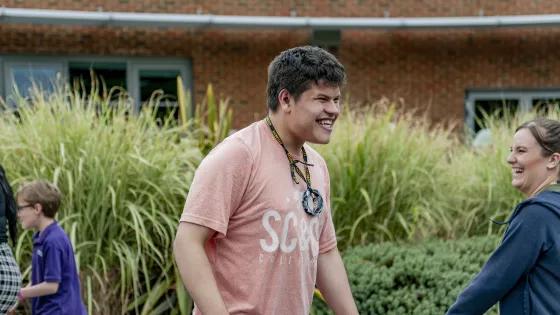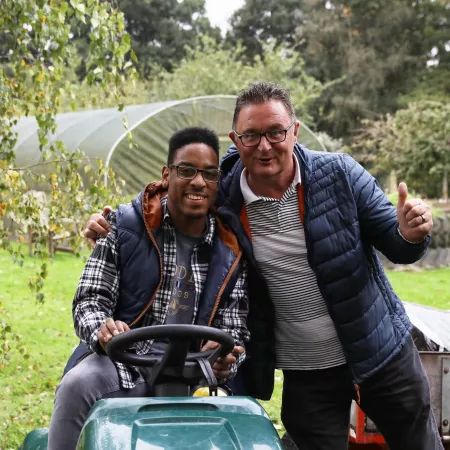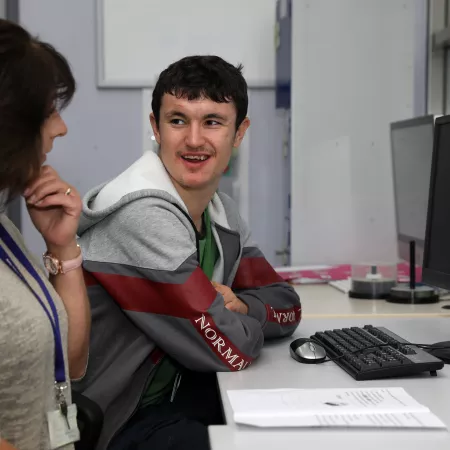Personalised therapy and medical services
Our Wellbeing team is situated within the School and College. The team employs a transdisciplinary model with our colleagues in the education, medical and care teams. Our transdisciplinary approach delivers a systemic practice to enhance the learning experiences of students.
We provide renowned medical facilities, dedicated professional teams across various disciplines, and specialist and nursing care.
We deliver personalised therapy and medical services to meet the diverse, often complex needs of students, supporting their health, wellbeing, happiness, educational achievement and personal development.
Therapies
Occupational therapy
At St Piers School and College our onsite occupational therapy department work regularly with pupils and students to support their wellbeing and independence skills.
We support students maximise their strengths and problem solve any difficulties. OTs focus on daily living tasks which ensures that we work alongside colleagues across the campus in both education and residential services.
To make sure each student receives the best possible care, we use a mix of informal and standardised assessments supplemented with frequent observations of pupils at work and play.
We liaise with carers, parents and other professionals to develop holistic therapy programmes tailored for each individual to ensure they continue to develop and maintain their skills.
Much of the work we do at St Piers encompasses safety and equipment provision to support specific tasks.
Physiotherapy
Physiotherapy helps restore movement and functional independence which promotes wellbeing.
Physiotherapy at Young Epilepsy focusses on individualised goals, which are frequently assessed and monitored. We support students to maintain and improve their mobility, balance and motor function.
Young people who require physiotherapy input after their initial assessment are provided with a personalised therapy programme to support their development. Timetabled sessions may be put in place in a variety of settings including the swimming pool and trampoline for rebound therapy.
Dependent on the young person’s needs physiotherapy is provided as group or individual sessions. Specialised equipment such as standing frames and walkers are put in place and managed by physiotherapy.
Working closely with our colleagues, off site professionals and families we strive to ensure the best possible physical outcomes for our young people.
Play therapy
At St Piers, we consider play to be absolutely essential – and not just because it’s fun.
Play supports children and young people’s education, teaches them about interacting with each other, and improves their sense of control in everyday situations.
It helps them to understand and express themselves, in a safe environment where the therapist can support them in developing emotional resilience and working through their concerns. It is non-directed and therefore relies on the child or young adult to express through play what is internal to them.
Our dedicated play specialist and play therapist provide advice and support to the teaching and care teams on play and activities specific to each pupil and student’s development.
Where possible, our specialists include group sessions to help pupils and students enjoy interacting with their peers, form friendships and develop skills such as turn-taking.
Psychology
St Piers offers educational opportunities for a wide range of children and young adults. The students will come with diagnosis of learning disabilities, autism, epilepsy and present with distressed behaviour due to trauma or dysregulation of emotions.
The psychology team is diverse and includes psychologists, positive support practitioner, play specialist, play therapist and Intensive Interaction coordinator.
We also provide training to staff, carers, and external audiences on topics such as ELSA, Solution Focused Brief Therapy for children and adolescents, attachment, PDA, ADHD and autism.
The team provides behaviour support based on person-centred approaches and systemic practice.
Assessments that are evidence-based practice and modelled on a strength-based approaches and systemic leanings.
We meet and liaise with the educational and residential teams to discuss concerns and support them in their relationships and working with the students through consultation, training, and coaching.
We will work with the families to support them in caring for their children.
The team will provide group therapy sessions or individual therapy as appropriate to the pupil and student.
Sensory therapy
When children have neurological disorders, it’s absolutely essential that we find alternative ways for them to interact and communicate.
Sensory stimulation plays a huge part in what we do at St Piers, both in teaching and in School and College life in general.
Uniquely at St Piers, our sensory suites play a central role in everyday life at St Piers School.
These state-of-the-art art rooms, relaxing yet stimulating, allow pupils and students to interact and respond in different ways, some of which may not have been available to them before.
They can express themselves in a variety of ways, including through art, music and movement.
If a student needs to build up their confidence, or needs one-on-one time with a teacher, a sensory suite can provide the necessary calm, giving them time to build their confidence away from daily distractions.
We find the sensory rooms help to reduce fidgeting, improve concentration and put pupils and students in a better frame of mind to learn or carry out a task.
Our sensory suites have been so successful that we’ve installed them in a number of the residential houses and in several other locations around the campus.
Find out more about our residential care and campus
Speech and language therapy
Speech and Language input at St Piers is provided through the waking day curriculum.
A Total Communication Approach is used where objects, photographs, symbols and Makaton signing are used to support student’s understanding and expression. Speech and Language Therapists work with students to develop their functional communication system.
For some of our students this is working on supporting their verbal language development and for others this is establishing or supporting the use of an Augmentative or Alternative Communication (AAC) system which may support or replace verbal communication. We work with students with approaches such as the Picture Exchange Communication System (PECS), Communication Boards, Communication Books, Voice Output Communication Aids (VOCAs) and Makaton.
We aim for all of our students to have a meaningful functional and reliable communication systems with which they can communicate with those around them effectively. We work with students across the curriculum and where indicated we will see students for individual or group sessions.
Speech and Language Therapy also provide support for students with their eating, drinking and swallowing where necessary. We support those with dysphagia as well as those who have difficulties around eating and drinking for other reasons, such as those with a sensory origin.
We work closely with the dietician we have one day per week. The dietician provides nutritional support to a range of students, those who eat and drink orally as well as those with gastrostomies.
Find out more about our approach to Communication.
Medical support
At St Piers School and College, we have the Young Epilepsy Neville Childhood Epilepsy Centre, alongside us on campus. This is a renowned medical facility offering specialist services for children and young people with a wide range of neurological conditions. There is nowhere else in the UK quite like the Neville Centre.
The nurses based in this centre provide first rate care to meet the diverse and sometimes complex medical needs of our students when they need it. Whilst the centre provides a wide range of external health services, when required, with the appropriate referral, St Piers students can access additional services such as VNS and diagnostics including EEG and telemetry. Most importantly, the nurses working in conjunction with parents and carers provide important links with external medical consultants.
The familiar faces of our fully trained medical staff go a very long way to helping students feel calm, comfortable and reassured.
Having the Neville Centre so close is a huge comfort to parents, providing reassurance, minimising distress and greatly improving the lives of our students.




